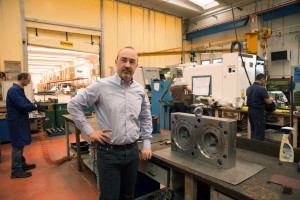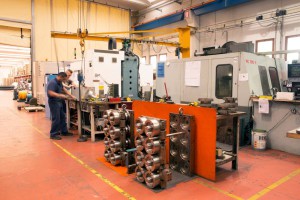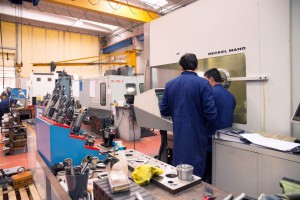 A toolshop essentially established for the design and manufacturing of injection moulds and thermoforming of containers for flower nurseries that has always staked on technological innovation. And that nowadays, relying on the experience gained in almost 40 years of activity, focuses on the internationalization and diversification of its customers, too.
A toolshop essentially established for the design and manufacturing of injection moulds and thermoforming of containers for flower nurseries that has always staked on technological innovation. And that nowadays, relying on the experience gained in almost 40 years of activity, focuses on the internationalization and diversification of its customers, too.
A linear and simple mission is accomplished by Officina Cannarozzi, the subcontracting manufacturing of moulds. With the target of conceiving, designing and manufacturing them skilfully and of providing its customers also with the necessary support to choose the best materials and solutions, in order to reduce the finished product cost. It is not easy to match quality with saving and the compliance with delivery terms but the recipe of Officina Cannarozzi contains all the experience in the mould matter of its founder Rocco, supported by his son Adriano. The latter, after graduating in 2001 in mechanical engineering at Milan Polytechnics has lavished in the family company new energy and particular attention to the continuous technological upgrading of both machines and software used in the design and development of moulds. We met him in the headquarters of the toolshop at Osio Sotto, in Bergamo province, to see as usual the mould world through the eyes of a protagonist.
How is your activity going?
Very well, with a growing turnover that today reaches one million Euros. In 2009, we suffered a drop that had alarmed us, like all I think, but in the last few years the trend has become positive again. I feel the recovery, in conclusion.
In a couple of years you will celebrate the fortieth anniversary of the foundation won’t you?
Yes, the company was founded by my father Rocco who, after gaining experience in the manufacturing of moulds and dies as employee, started his own activity in 1976. In that year was established Arca, specialized in the moulding of plastic containers, for which since the beginning Officina Cannarozzi started implementing numerous moulds.

Taking up a surface of 500 square metres, the toolshop is equipped with modern NC metalworking machines.
Do you work only for Arca?
No, we do not. We work for other customers in the most various sectors, from aerospace to accessories for agriculture. Besides, we have increased our activity abroad, with good results especially with Russian customers.
Do your competences concern injection moulds only?
Our specialization is represented by the equipment for the injection moulding of plastic materials for products that range from vases to chandeliers but, some time ago, we started manufacturing also moulds for the thermoforming process.
A completely different system. What are the advantages in comparison with injection moulding?
A thermoformed vase is generally lighter and then you save material (generally polypropylene), but the advantage especially concerns the shorter cycle times and the number of optimal impressions for moulding. In thermoforming, you can use also extruded sheets in two different colours, to manufacture vases with the black interior for roots and externally coloured for aesthetical purposes. Currently, thanks to the experience gained in both processes, we offer both mould typologies to our customers.
What do you think of the moulds produced in “low-cost” Countries?
We always receive at our workshop moulds of Chinese provenience that do not function well and on which we have made the modifications requested. They can cost even half of those produced in Italy but if the companies that order them have no local offices able to follow machining operations from close up it is presently unconceivable to obtain a mould able to operate since the beginning. Some toolshops refuse executing interventions on this kind of moulds whereas for us it is anyway a machining like several others.
 Your company, you have said, apart from the downturn phase in 2009, is characterized by a positive growth trend. A good result, considering that the market is influenced on one hand by the increasing offer of moulds coming from East Europe and Far East and on the other hand by your customers that need to reduce the costs of the entire process. How do you succeed in growing in this context, despite all that?
Your company, you have said, apart from the downturn phase in 2009, is characterized by a positive growth trend. A good result, considering that the market is influenced on one hand by the increasing offer of moulds coming from East Europe and Far East and on the other hand by your customers that need to reduce the costs of the entire process. How do you succeed in growing in this context, despite all that?
To meet customers’ requirements, we have invested in more efficient equipment, improved our flexibility and focused on specialization. The market has changed, the big volumes of the past do not exist anymore for several products, lines are upgraded much more often than in the past … The result is that also moulds must be less expensive, made with suitable materials for the life of the product that will be moulded. It is useless to use an excellent steel for a mould that a couple of years later will not be used and therefore it is important our capability of suggesting adequate materials and machining processes for what the equipment will actually mould. This is not sufficient, anyway, to reduce costs: we, toolshops, must be able to increase our efficiency and, according to this strategy, the most performing machines are as indispensable as the personnel training and the work organization.
Can 3D-printing technologies be helpful in this business trend?
At the last edition of MecSpe, in the ambit of the 3D Print Hub event dedicated just to 3D printing, I examined with interest the proposals of moulds implemented with 3D printers by Stratasys, which in the course of the exhibition were then used to moulds bottles and small cars on a BabyPlast (the small desk injection press produced by Cronoplast and marketed in Italy by Rambaldi, editor’s note). It is an undoubtedly interesting solution, which is not however suitable for our current typology of customers. We will anyway seriously consider this kind of solutions, also because the investments for printer and injection machine are not huge, all considered.
History and specializations of Officina Cannarozzi
The origins of Officina Cannarozzi date back to 1976, when Rocco Cannarozzi (father of Adriano, who is today general manager and member of the family-owned company together with his father, still working in it) establishes the enterprise after gaining notable experience first in the die sector and afterwards in the injection moulding ambit. Today the company, which counts one dozen of employees, besides father and son, and reaches a turnover of one million Euro, mainly operates in the production of moulds for injection moulding and for the thermoforming in the container field. The workshop takes up a surface of 500 square metres. The technical competences of the company range from the integral mould design to the complete manufacturing of each of its components, including the hot runner for sandwich moulds up to 32 cavities.
One of the strong points of Officina Cannarozzi is represented by the excellent machine fleet of the toolshop, constantly upgraded. Thanks to DMG 125 P 5-axis machining centres and to the NC lathes DMG and DAEWOO Puma 600 M, the Bergamo company can mill big-size pieces that reach 1250 x 1250 x 800 millimetres and turn up to ø 1000 x 1600 millimetres. CNC lathes with C controlled axis and powered tools allow both turning and milling and can manufacture complex parts in a single setup. In particular, the five-axis milling that the workshop introduced in 2000, permits a considerable time saving in the implementation of complex parts, since it allows machining parts on 5 sides in a single setup and carrying out machining otherwise unfeasible with the three axes only. To full benefit of the final cost of the mould, which manages to be competitive in this market context where Officina Cannarozzi is more and more often requested to provide solutions able to reduce the final price of products, moulded in smaller and smaller volumes. Finally, wire and plunge EDM allow completing the survey of machining demanded in mould and die making. Speaking of software, for the design of moulds they use Autocad and the CAD/CAM programme by Cimatron specifically dedicated to the mould manufacturing, from the estimate to the delivery.
Works in progress
When we interviewed Adriano Cannarozzi, in workshop they were putting the last finishing touches to a two-cavity mould (with hot runner directly made by Officina Cannarozzi and not purchased on the market) for a product that will be moulded in not more than 40,000 units per year. «Our customer has authorized us to let you take the pictures of both moulds and of a product similar to the item that will be moulded with our equipment but they have asked us not to go into the details of its use, for the moment» states the general manager of the Bergamo company. This mould is an example of the way of proceeding of our workshop, which does not only literally satisfy its customers’ demands but can advise them about the best solutions to be adopted. «For saving, the customer wanted a mould of aluminium or of C40, a low-quality hardened and tempered steel. We instead suggested to them, and they accepted our advice, choosing steels like 1.2738 or 1.2311, characterized by better quality, even if they are hardened and tempered, too ».



